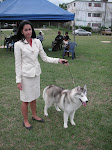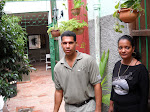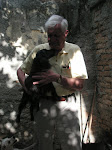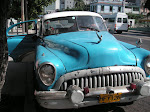To Have and Have Not
Cuba has two currencies. The original is called "moneda nacional (MN)" and is what the common citizen carries around and what shows up in his paycheck. It takes about 25 pesos of moneda nacional to equal one dollar US. In the early 1990's, after the fall of the Soviet Union, times were tough in Cuba as their support payments from the USSR dried up, never to return. The Cuban government's reaction was to allow dollars to circulate--that's right, good old American Greenbacks. That gave people a hard currency to use in trade, but I imagine Fidel and his friends soon tired of having George, Abe, Alexander, and Andrew's pictures in their wallets.
They didn't try to replace the MN peso with a hard currency because they didn't have enough assets to back a true, universally used hard currency, so someone invented the CUC, which means convertible currency. CUC's are worth about $1.08 each, and it is the currency you use as a tourist while in Cuba.
Now don't expect to get a supply of CUC's at your local bank for your trip to Cuba--it won't happen. The only place you can exchange dollars and CUC's is at the Cuban airports on arriving or leaving and at various Cuban currency exchanges, perhaps in your hotel. But before you load up on dollars to exchange for CUC's in Cuba, you should know that the Cuban government assesses a 20% penalty for exchanging dollars and CUC's. Frankly it's better to buy Euros at home and then exchange CUC's with Euros once you're there.
Oh, and don't forget to spend as many of your CUC's as you can before heading to the airport to leave. When you try the EURO/CUC exchange on leaving, they'll see you are flying to the US and insist on giving you dollars for your CUC's, even if you want Euros. And of course they get the 20% penalty too. So CUC's are a hard currency, sort of, and with them you can buy nearly anything you want in Cuba. Yes, if you have the CUC's, which ordinary citizens don't, you can get nearly anything you want. Let's see how it works.
A shiny new Peugeot or Hyundai taxi charges you CUC's while the citizen flags down 1950's era jitneys which give off smoke and noise. He pays in MN Pesos. Even the cute little Coco Taxis accept CUC's, but the citizen pays MN for an old man powered Pedi cab ride. A foreign national with permission to live and work in Cuba gets paid from his company in hard currency and can even buy a new car--paying in CUC's of course. The man in the street is on foot in the street because he'll never have enough CUC's to buy a car, and he couldn't anyway because he can't get official permission to buy it.
This two world existence has created a privileged class in Cuba. They aren't wealthy Cubans; they are the hotel maids, waiters and taxi drivers. They get their tips in CUC's and have access to many consumer items that only ex-pats and foreign business people can buy.
And if you're a dog owner with CUC's what is the local vet's office like? Well, you can find some who cater to the moneyed people. I priced a 20 pound bag of kibbled dog food in the vet's vestibule. It was $57 CUC--not exactly cheap. You don't need a prescription for your pet meds, but they are on sale at the vet's. The prices are in CUC's, which limits the clientele considerably.
On Calle Obispo, Havana's main tourist shopping street, there's a pet store. There I priced a decent looking dog collar at 14 CUC. Too steep for my budget, I thought. So no wonder you don't see the Cuban workers in those stores--their salaries range from the equivalent of 15 to 25 dollars a month. Yes even specialist medical doctors can't afford to shop in those places.
Here in the US we complain that taxes are too high and the dollar doesn't buy enough, but at least we don't have to contend with two currencies, one of which is worthless and the other reserved for visitors.
Les Inglis
Friday, November 26, 2010
Friday, November 19, 2010
Going Behind What's Left of the Iron Curtain
Going Behind What's Left of the Iron Curtain
If you are a US citizen visiting Cuba, it's initially hard to be sure you are welcome or not. As you land at Havana's Jose Martí airport, your plane taxis past a modern airport building bristling with jetways and populated with planes from all over the world, British Airways, Lufthansa, Quantas, and many others. But you keep on taxiing until you come to a low building that looks like something out of the 1950's. No jetways, no Varig from Brazil. If there is another plane around it is another little charter flight from the US like Sky King Airlines.
I remember an afternoon kid's radio program called Sky King in the 1940's. It wasn't very good, and the charter airline with the same name is nothing to write home about, either. Well, back to the airport--it's a ghost of the past, and if you ask a regular traveler, he'll tell you only the US flights use it. The airport terminal seems to be a vestige of the pissing contest the two countries have carried on for 50 years. By now you don't expect a jetway, and you think you'll be lucky if they roll up a set of stairs to help get out of the plane.
Once inside you're in a big room with a line of kiosks across the back side of it. Attendants there keep you standing behind a red line on the floor until you are motioned to one of the agents-in-a-box. This box is different from those at home in that the agent's desk is above your line of sight. You can't see what he's doing as he inspects your passport and customs card. You may get some questions here, especially if you are traveling with some medicines, as I always am. There's no smile, no "welcome to Cuba," just a chilly stare, and finally a bunch of rubber stamping noises, and your papers are handed back. You've been standing in a narrow passage between two kiosks, and you guess that you must leave it through the door you didn't use to enter. You think at least he spoke English.
You emerge into a large baggage room and place your handbags on the conveyor of an x-ray machine. You might ask, "Why do they x-ray arriving passenger's things?" Well, it's their country, and if that's what they want, you have to comply. If you're carrying a bag full of vet meds and supplies, the kiosk guy has probably fingered you for another interview with a Customs agent. It's happened to me 3 out of 5 times. They invite you over to a small circular stand up table and begin a fresh set of questions. This agent is probably female, pleasant, and has a nice smile. The questions are the same as those on your customs form, and after a while, she decides you're not a terrorist, and you can go look for your checked luggage. Of course it isn't up yet because every Cuban national on your flight has spent a fortune on purchases in the US and then checked them as luggage. There are flat screen TV's in huge cardboard cartons, microwaves, computer towers, and almost everything else easy to get in the US and hard to get in Cuba. Most of the stuff comes in a cocoon of blue plastic film, and it takes the baggage crew the better part of an hour to disgorge the plane's checked luggage.
I'm lucky to have made friends with the Havantur agent lady. She recognizes me every time I show up. She assures me and my two traveling companions that our stuff will show up on the carousel eventually. And it does. Another line has formed as an agent checks every traveler's bag tag with his luggage receipt. My Havantur friend walks us around that line, and we emerge from the old building into the rest of Cuba. This is the first opportunity we've had to see the crowds waiting to meet the travelers, and there in the middle of the crowd is Nora and our driver. We leave Cuba's version of the TSA, and our adventure begins.
Les Inglis
If you are a US citizen visiting Cuba, it's initially hard to be sure you are welcome or not. As you land at Havana's Jose Martí airport, your plane taxis past a modern airport building bristling with jetways and populated with planes from all over the world, British Airways, Lufthansa, Quantas, and many others. But you keep on taxiing until you come to a low building that looks like something out of the 1950's. No jetways, no Varig from Brazil. If there is another plane around it is another little charter flight from the US like Sky King Airlines.
I remember an afternoon kid's radio program called Sky King in the 1940's. It wasn't very good, and the charter airline with the same name is nothing to write home about, either. Well, back to the airport--it's a ghost of the past, and if you ask a regular traveler, he'll tell you only the US flights use it. The airport terminal seems to be a vestige of the pissing contest the two countries have carried on for 50 years. By now you don't expect a jetway, and you think you'll be lucky if they roll up a set of stairs to help get out of the plane.
Once inside you're in a big room with a line of kiosks across the back side of it. Attendants there keep you standing behind a red line on the floor until you are motioned to one of the agents-in-a-box. This box is different from those at home in that the agent's desk is above your line of sight. You can't see what he's doing as he inspects your passport and customs card. You may get some questions here, especially if you are traveling with some medicines, as I always am. There's no smile, no "welcome to Cuba," just a chilly stare, and finally a bunch of rubber stamping noises, and your papers are handed back. You've been standing in a narrow passage between two kiosks, and you guess that you must leave it through the door you didn't use to enter. You think at least he spoke English.
You emerge into a large baggage room and place your handbags on the conveyor of an x-ray machine. You might ask, "Why do they x-ray arriving passenger's things?" Well, it's their country, and if that's what they want, you have to comply. If you're carrying a bag full of vet meds and supplies, the kiosk guy has probably fingered you for another interview with a Customs agent. It's happened to me 3 out of 5 times. They invite you over to a small circular stand up table and begin a fresh set of questions. This agent is probably female, pleasant, and has a nice smile. The questions are the same as those on your customs form, and after a while, she decides you're not a terrorist, and you can go look for your checked luggage. Of course it isn't up yet because every Cuban national on your flight has spent a fortune on purchases in the US and then checked them as luggage. There are flat screen TV's in huge cardboard cartons, microwaves, computer towers, and almost everything else easy to get in the US and hard to get in Cuba. Most of the stuff comes in a cocoon of blue plastic film, and it takes the baggage crew the better part of an hour to disgorge the plane's checked luggage.
I'm lucky to have made friends with the Havantur agent lady. She recognizes me every time I show up. She assures me and my two traveling companions that our stuff will show up on the carousel eventually. And it does. Another line has formed as an agent checks every traveler's bag tag with his luggage receipt. My Havantur friend walks us around that line, and we emerge from the old building into the rest of Cuba. This is the first opportunity we've had to see the crowds waiting to meet the travelers, and there in the middle of the crowd is Nora and our driver. We leave Cuba's version of the TSA, and our adventure begins.
Les Inglis
Friday, November 12, 2010
Waste Not, Want Not
Waste Not, Want Not
Both Cuba and the US have laws preventing the use of drugs beyond their expiration dates. While some suspect the biggest reason behind these laws is to insure the profits of the drug companies, these laws are studiously respected, and thus we can all rest assured the medicines we receive are fresh. Expiration dates are common for many medical supplies also like latex gloves, injection syringes, sutures and staples, and bandages--even gauze pads. Vets as well as medical doctors respect the expiration dates, so animals as well as humans need not fear drugs which have lost their efficacy.
Here in the US, older drugs are segregated, and, if the nurse in charge is extremely careful, drugs within a couple of weeks of their expiration dates can be returned for credit to the drug manufacturer. More often than not, this tight time frame for returning expired meds is missed, and they end up being destroyed. US vets are as religious as medical doctors in following the law.
In Cuba, however, things are different. While medical doctors and hospitals use fresh drugs only, vets who treat dogs and cats there have to make do with whatever they can find to treat household pets. The state owns the farm animals and the vets apply their best practice and fresh drugs on them. But household pets are of no interest to the state, and it is difficult to find fresh drugs in the doses that apply to smaller animals.
Many Cuba vets work with donated outdated drugs given to them by hospitals. Jose, our vet friend who works in Old Havana (see Making Ends Meet in this blog for June 11) has a box of old injectable drugs given to him by a hospital. He has become an expert in how long past the expiration date various kinds of medicines are still effective. He has found some anesthetic drugs work several years after expiration. He also has found some drugs can be substituted for others and work almost as well. In Cuba--with veterinary medicines--necessity is the mother of invention.
Is it a bad thing these drugs are used after expiry? Well, I'm not so sure. How many dogs and cats have survived surgeries, infections, and other threats due to the good offices of Cuba's fine, hard pressed veterinarians? A huge number, I believe.
Here at The Aniplant Project, we have been collecting drugs too old for return from several vets. With a little trouble these can be inventoried, packed, and shipped to Cuba. If Nora Garcia, the President of Aniplant, can't use them, she can trade them to the may vets she knows for their help in her weekly spay-neuter clinics
If you have a vet, ask him if he has outdated meds and supplies. Tell him we can use them to help Cuban dogs and cats. Good vets care about animals everywhere, and many vets are happy to donate when asked. Another source of these medicines are drugs left over after a pet dies. People often give them back to their vets. Regardless, call me if you get any such meds or supplies (941-928-8343 anytime). I'll take them off your hands, and you can become a participant in helping lots of needy animals really close to us--just across the Florida Straits/
Les Inglis
Both Cuba and the US have laws preventing the use of drugs beyond their expiration dates. While some suspect the biggest reason behind these laws is to insure the profits of the drug companies, these laws are studiously respected, and thus we can all rest assured the medicines we receive are fresh. Expiration dates are common for many medical supplies also like latex gloves, injection syringes, sutures and staples, and bandages--even gauze pads. Vets as well as medical doctors respect the expiration dates, so animals as well as humans need not fear drugs which have lost their efficacy.
Here in the US, older drugs are segregated, and, if the nurse in charge is extremely careful, drugs within a couple of weeks of their expiration dates can be returned for credit to the drug manufacturer. More often than not, this tight time frame for returning expired meds is missed, and they end up being destroyed. US vets are as religious as medical doctors in following the law.
In Cuba, however, things are different. While medical doctors and hospitals use fresh drugs only, vets who treat dogs and cats there have to make do with whatever they can find to treat household pets. The state owns the farm animals and the vets apply their best practice and fresh drugs on them. But household pets are of no interest to the state, and it is difficult to find fresh drugs in the doses that apply to smaller animals.
Many Cuba vets work with donated outdated drugs given to them by hospitals. Jose, our vet friend who works in Old Havana (see Making Ends Meet in this blog for June 11) has a box of old injectable drugs given to him by a hospital. He has become an expert in how long past the expiration date various kinds of medicines are still effective. He has found some anesthetic drugs work several years after expiration. He also has found some drugs can be substituted for others and work almost as well. In Cuba--with veterinary medicines--necessity is the mother of invention.
Is it a bad thing these drugs are used after expiry? Well, I'm not so sure. How many dogs and cats have survived surgeries, infections, and other threats due to the good offices of Cuba's fine, hard pressed veterinarians? A huge number, I believe.
Here at The Aniplant Project, we have been collecting drugs too old for return from several vets. With a little trouble these can be inventoried, packed, and shipped to Cuba. If Nora Garcia, the President of Aniplant, can't use them, she can trade them to the may vets she knows for their help in her weekly spay-neuter clinics
If you have a vet, ask him if he has outdated meds and supplies. Tell him we can use them to help Cuban dogs and cats. Good vets care about animals everywhere, and many vets are happy to donate when asked. Another source of these medicines are drugs left over after a pet dies. People often give them back to their vets. Regardless, call me if you get any such meds or supplies (941-928-8343 anytime). I'll take them off your hands, and you can become a participant in helping lots of needy animals really close to us--just across the Florida Straits/
Les Inglis
Friday, November 5, 2010
Means of Communication
Means of Communication
The only three ways we really have to interact with Aniplant in Cuba are mail, email, and actual visits. And these often seem to be less reliable than I would have them. Mail between the US and Cuba is a somewhat iffy proposition.
Several months back I found a postal regulation covering mailing items to Cuba. Prior to that I had failed to get a letter or a package through to Nora. Starting at the beginning of this year, with a package of vet supplies and that postal regulation in hand, I marched into the local Post Office and accosted a woman behind one of the counters. She looked at the address on the package, saw the destination was Cuba, and began to tell me they couldn't accept the package. She pulled up several screens on the display at her desk and then repeated it couldn't go.
I asked for the Postmistress come over and to read the regulation I had found, and she looked briefly at it and then started pulling pages up on her little screen. "Nope, there's no way to send it," she said, and I was beginning to look bothered. I know hundreds of thousands of Floridians have relatives in Cuba, and they mail them packages all the time.
"Wait a minute," said Alice from the end counter; "I have something on Cuba here." (Alice is the only attendant in the Post Office I can trust to know what can and cannot be done.) She had pulled up a page on her screen, and the Postmistress walked down to her desk. Now the first attendant joined them to make a trio reading Alice's screen, and finally I was told it could be shipped after all. Since then I have sent a half dozen boxes this way, but the staff at the Post Office still look like they wish I would use another Post Office for my Cuba business.
Email is another story. There is no human behind a desk to argue with you, but when your server doesn't deliver everything you send, you wish there were a real person around. I've used Microsoft Outlook for years to send email without a problem, but it has failed completely recently, and it became so unreliable I had to stop using it altogether. Then I started to use Comcast's Smart Zone, but it only thought it was smart. Still, some of my sent items never arrived. I set up Hotmail and Gmail accounts, and now I'm using Windows Live Mail on a new computer.
Well I'd like to tell you that email problems are a thing of the past, but no such luck. All I can say is most stuff arrives here OK, so don't stop writing. Most of my outgoing works too, but every so often, my outgoing emails go into a black hole.
The final and best means of communication is to visit Cuba. I've been there 5 times, and I have another trip planned for late February. Cuba is such an interesting place that it's worth figuring out all the licenses, affiliations, approved agents and charter flights. Of course one little misstep, and they don't let you fly, and then you're no better of than you were with mail or email.
Les Inglis
The only three ways we really have to interact with Aniplant in Cuba are mail, email, and actual visits. And these often seem to be less reliable than I would have them. Mail between the US and Cuba is a somewhat iffy proposition.
Several months back I found a postal regulation covering mailing items to Cuba. Prior to that I had failed to get a letter or a package through to Nora. Starting at the beginning of this year, with a package of vet supplies and that postal regulation in hand, I marched into the local Post Office and accosted a woman behind one of the counters. She looked at the address on the package, saw the destination was Cuba, and began to tell me they couldn't accept the package. She pulled up several screens on the display at her desk and then repeated it couldn't go.
I asked for the Postmistress come over and to read the regulation I had found, and she looked briefly at it and then started pulling pages up on her little screen. "Nope, there's no way to send it," she said, and I was beginning to look bothered. I know hundreds of thousands of Floridians have relatives in Cuba, and they mail them packages all the time.
"Wait a minute," said Alice from the end counter; "I have something on Cuba here." (Alice is the only attendant in the Post Office I can trust to know what can and cannot be done.) She had pulled up a page on her screen, and the Postmistress walked down to her desk. Now the first attendant joined them to make a trio reading Alice's screen, and finally I was told it could be shipped after all. Since then I have sent a half dozen boxes this way, but the staff at the Post Office still look like they wish I would use another Post Office for my Cuba business.
Email is another story. There is no human behind a desk to argue with you, but when your server doesn't deliver everything you send, you wish there were a real person around. I've used Microsoft Outlook for years to send email without a problem, but it has failed completely recently, and it became so unreliable I had to stop using it altogether. Then I started to use Comcast's Smart Zone, but it only thought it was smart. Still, some of my sent items never arrived. I set up Hotmail and Gmail accounts, and now I'm using Windows Live Mail on a new computer.
Well I'd like to tell you that email problems are a thing of the past, but no such luck. All I can say is most stuff arrives here OK, so don't stop writing. Most of my outgoing works too, but every so often, my outgoing emails go into a black hole.
The final and best means of communication is to visit Cuba. I've been there 5 times, and I have another trip planned for late February. Cuba is such an interesting place that it's worth figuring out all the licenses, affiliations, approved agents and charter flights. Of course one little misstep, and they don't let you fly, and then you're no better of than you were with mail or email.
Les Inglis
Subscribe to:
Comments (Atom)





























































































